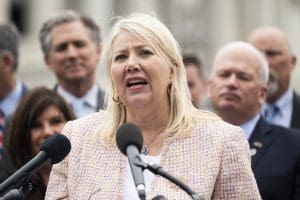GOP Rep. Debbie Lesko wants to make sure no schools offer 'Pot Smoking 101' classes
Rep. Debbie Lesko (R-AZ) worries that academic research into cannabis will lead to university classes in marijuana smoking.

Rep. Debbie Lesko (R-AZ) unsuccessfully attempted on Tuesday night to defund colleges and universities that do cannabis research. She warned that without such a move, schools might soon offer classes dedicated entirely to pot smoking.
“Universities can conduct marijuana research if they go through proper procedures, but Dems want to skirt the rules,” Lesko tweeted. “Who’s to say we won’t have Pot Smoking 101 classes dedicated to smoking marijuana under the false pretense of ‘research’?”
In a floor speech in the House, she warned that a H.R. 4502, a pending bill on appropriations for the departments of Labor, Health and Human Services, and Education, would allow “cannabis growing and research without any safeguards.”
“An appropriations package is quite simply not the place for a debate on the legalization of or looser restrictions for marijuana,” Lesko argued. “My colleagues across the aisle are using this partisan package as a roundabout way of legalizing marijuana without having any meaningful debate about its classification as a Schedule 1 drug or the effects that the drug has on Americans’ health.”
A Lesko spokesperson did not immediately respond to an inquiry about whether she has evidence that universities and colleges offered or were preparing to offer courses in pot smoking.
Lesko offered an amendment to remove section 316 of the bill, containing $253.8 billion in appropriations for 2022 and introduced by Appropriations Committee Chair Rosa DeLauro. The section reads, “None of the funds appropriated by this title for the Department of Education shall be withheld from an institution of higher education solely because that institution is conducting or preparing to conduct research on marihuana as defined in 21 U.S.C. 802(16),” the section of the United States Code Controlled Substances Act that defines “marihuana.”
Lesko’s amendment failed, with 147 votes in favor and 276 votes against.
Contrary to her comment that the vote was some sort of partisan maneuver, 60 House Republicans joined with every Democratic lawmaker present in voting no.
Nothing in the appropriations bill changes the federal law that classifies cannabis as a controlled substance “with no currently accepted medical use and a high potential for abuse.”
But 18 states and the District of Columbia have eliminated state laws prohibiting recreational cannabis use by adults over age 21. Another 19 allow it to be used for medical purposes.
Lesko’s home state of Arizona last year enacted Proposition 207, a voter initiative to legalize the possession and use of cannabis by adults over the age of 21. It passed with more than 60% of the vote. Voters in Lesko’s home county of Maricopa backed it 1,217,089 to 787,437.
When the U.S. House in December 2020 passed by a vote of 228-164 a bipartisan bill that would have decriminalized cannabis under federal law, Lesko voted no. That legislation died without a vote in the Republican-controlled Senate.
With Democrats holding a narrow majority in the Senate, Democratic Sens. Chuck Schumer (NY), Cory Booker (NJ), and Ron Wyden (OR) on July 14 proposed similar draft legislation. Schumer said, “I will use my clout as majority leader to make this a priority in the Senate. It’s not just an idea whose time has come, it’s long overdue.”
A November Gallup poll found that 68% of Americans support legalization. In 1969, when Gallup first measured views on the issue, it had 12% support.
Published with permission of The American Independent Foundation.
Recommended

Alaska House committee advances, expands proposal to bar trans girls from girls sports
Amended bill would add elementary, middle school and collegiate sports to limits in place for high school
By Claire Stremple, Alaska Beacon - April 16, 2024
Senate clears gallery, passes bill to arm Tennessee teachers
Covenant parents emotional in wake of vote
By Sam Stockard, Tennessee Lookout - April 10, 2024
Not if, but when: Parents of slain Parkland students urge Utah lawmakers to pass school safety bill
The parents of children killed in the 2018 Marjory Stoneman Douglas High School shooting have a stark warning for Utah lawmakers: “It’s not a matter of if, it’s a matter of when and where the next school shooting will happen.”
By Kyle Dunphey, Utah News Dispatch - February 21, 2024












































































